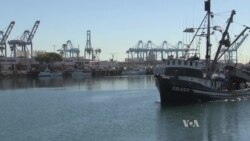Squid have pretty much disappeared from Southern California in the last several months.
“Squid’s kind of our bread and butter. That’s what a lot of us make our payments and survive on,” said Corbin Hanson who fishes off the coast of Southern California.
”It’s extremely frustrating. It’s demoralizing to go out and not be able to catch anything,” Hanson said.
Hanson has not caught any squid for more than four months. Squid is one of California’s largest commercial fisheries, and much of it is exported to countries in Asia and the Mediterranean.
Oceanographer Andrew Leising with the National Oceanic and Atmospheric Administration Fisheries said unusually warm water is causing squid and other fish to move farther north. At a meeting at the Aquarium of the Pacific, scientists explained one cause of the warming waters is what they call “the blob.”
“During the, say, 30-year record, this event “the blob” stands out far beyond anything we’ve seen in that 30 years. And in terms of that total warmth of the water, it’s pretty much the warmest we’ve ever measured and over an extremely large volume of water,” Leising said.
At its warmest, “the blob” is 4 degrees Celsius above normal temperatures. While “the blob” warms the water’s surface layers, another weather phenomenon called “El Niño” is warming the deeper waters.
“We’re looking at a situation where we have two years of the blob warming the water. Now we’re going into El Niño warming the water, so we really have about three years solid of kind of these warm conditions that have been affecting the fisheries,” Leising said.
Oceanographers said while “the blob” is mostly gone, they don’t know if it will return. The National Weather Service’s Mark Jackson said there is a promising forecast for warm waters caused by El Niño.
“Those waters will cool through the summer, and it looks right now a very distinct possibility that we could be in a La Niña situation next winter,” Jackson added. “That’s where the waters in the eastern and central Pacific will actually cool below normal.”
Cooler waters next winter also mean good news for Corbin Hanson and his crew, but until then, they have to be frugal.
“There’s hardly anything spent on new equipment, new gear. We’re trying to get by and stop the bleeding this year,” he said.
Scientists said if there is a La Niña next winter, squid and other fish should return to Southern California.





